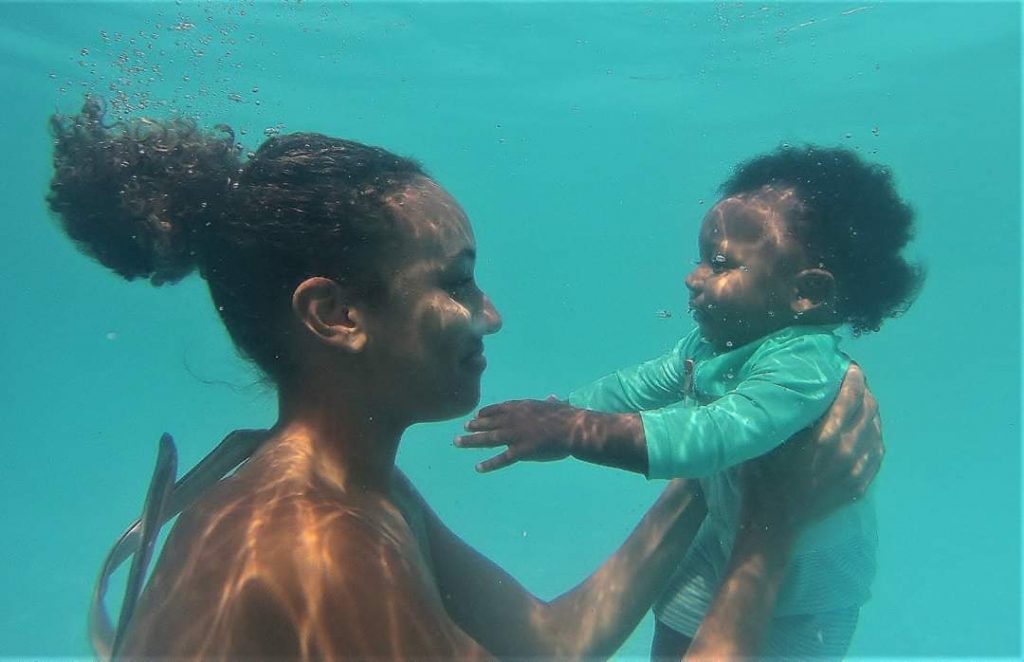
Swimming for Babies and Young Children
Aquatics and swimming for babies and young children in a safe and comfortable environment, promotes a positive experience to develop water confidence, safe practises and aquatic skills. These can become lifesaving as the child grows. A qualified baby swimming instructor will understand how to safely develop the use of reflexes that babies are born with, to promote early aquatic skills. Exercises are done through song and play to create a fun and stimulating environment for the babies and their parents or carers to grow together. A feeling of love and security in the water is the best and most efficient foundation for the skills that will enable babies to swim and become safe in the water.
When we talk about baby swimmers, we are not referring to babies and toddlers swimming across the pool using specific strokes, but to those who are comfortable and confident in the water, above and below the surface, and who can propel themselves naturally through the water. This will lead to swimming as soon as the babies and toddlers are physically and emotionally ready.
Benefits of Swimming for Babies and Young Children:
- A Skill for Life: Perhaps the most obvious benefit of baby swimming is the early learning of a life skill which will be beneficial for life. Babies and toddlers can learn key skills which they can perform calmly in a water emergency, such as floating on their backs, or turning and reaching for the nearest side, person or floating object, even before they can swim independently any distance. It goes without saying that being able to swim from an early age and being comfortable in water, greatly reduces the risk of childhood drowning.
- A Bonding Experience: The experience of swimming with your baby or toddler is exciting and fun and the sharing of positive experience and development of skills promotes the development of healthy attachments. The physical and emotional upheaval of babies and young children in the household can be tremendous, despite the fact that time spent together is some of the most precious experiences you can have. Weekly lessons provide you something to really look forward to. A special time, where you can focus on the joy of being with your baby, learning and experiencing new things together, whilst a qualified professional gently guides you through.
- Physical and Mental Development: There are many studies which explore the benefits of early swimming experiences on physical and mental development. Science Daily (Nov. 16, 2012) describes one of the most comprehensive studies carried out. “Lead researcher Professor Robyn Jorgensen says the study shows young children who participate in early-years swimming achieve a wide range of skills earlier than the normal population.”
- Following instruction: Learning to respond to voice commands should be a big part of any structured baby swimming programme. Reflexes play their part in any baby swimming programme, but babies also develop on from this, remarkably quickly, to learn how to hold their breaths, through responding to simple instruction. This is also good for Social and mental development.
- Exercise and physiological benefits: Growing with a sense that exercise is fun and an essential part of life is of huge value in today’s world. Regular exercise promotes well being and good health, as well as an energetic and sociable outlook on life. The physiological benefits of swimming include stronger heart and lungs, improved strength and stamina, co-ordination and agility. Babies who develop their swimming abilities are often more alert for their age, with a better eating and sleeping pattern.
- Self confidence: Early swimming fosters a growing sense of self-esteem, confidence and independence. As a child’s ability to freely move through the water increases so does their sense of well-being. Eventually, for those families who persevere, a point is reached where their child truly feels at home in the water.
Pool Requirements:
Not every pool is a suitable environment for baby swimming to take place, and the following factors must be considered.
- Water temperature: The temperature in a swimming pool used for baby swimming must be maintained above 30C or 32C for babies under 3 months old or weighing less than 12lbs. In Barbados this can be achieved, year round, through the use of a pool solar heater and when necessary, a pool cover when the pool is not in use. Wetsuits should be available for babies on cooler days or where the water temperature is below 30C. Babies are unable to control their body temperature in the same way that children and adults can.
- Depth: Teaching pools for baby swimming should be of a depth that adults can stand in comfortably. This is crucial as some parents may not be water confident and everyone should feel comfortable.
- Cleanliness and facilities: The pool and surrounding areas should be well maintained with a standard of hygiene. Baby changing facilities must be made available, along with areas for feeding and sufficient washrooms.
- Water quality: The quality of the water must be monitored and maintained to a high level, with well balanced chemicals.
- Atmosphere: The pool should have a relaxed atmosphere and not be crowded, to promote a feeling of well being.
Well maintained private pools are often able to provide the best environment for baby swimming, with a small, clean and friendly environment, with limited numbers of people around.
Instructors
Baby swimming instructors hold relevant qualifications, to ensure standards of safety and quality of instruction are fully maintained. This safeguards the infant or young child through an understanding of dangers, and emergency response, as well as ensuring that baby swimming is taught confidently using recognised techniques, relevant to aquatics and infant development.